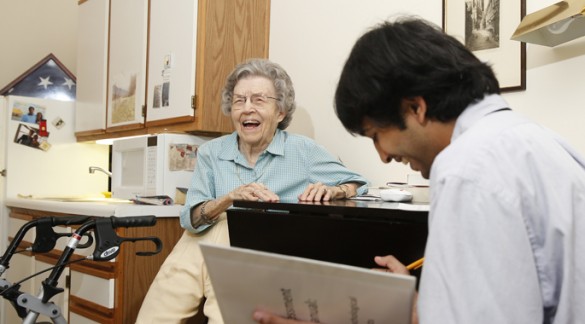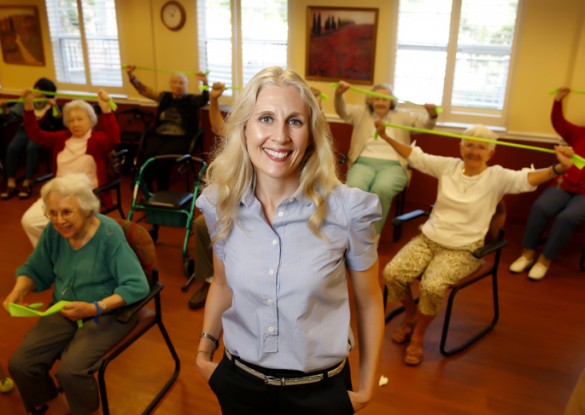
The Vanderbilt Center for Quality Aging is taking the “bench to bedside” concept of translational research out into the community, forming partnerships with assisted living facilities to examine how evidence can be put into action to improve the care of elders.
One of the projects, underway now at Belmont Village in Green Hills, is a pilot using evidence-based research to inform programming for memory-impaired residents. A second project, Abe’s Garden Alzheimer’s and Memory Care Center of Excellence, will break ground in November near Belle Meade. The partnership with Vanderbilt seeks to become a national model in generating best practices for Alzheimer’s care.
John Schnelle, Ph.D., the Paul V. Hamilton, M.D. Professor of Geriatrics and director of the Center for Quality Aging, along with research partner (and spouse) Sandra Simmons, Ph.D., associate professor of Medicine, say the trend of private, assisted-living facilities serving as hosts and partners in research is new.
“Dr. Simmons and I both do quality of life and care research focusing on staff and resident interactions in geriatrics. We are always looking for places that will allow us to not only do it, but also would support and encourage it. These partnerships offer everything from funding to active implementation of interventions and management programs, then allowing us to evaluate them and disseminate that evidence,” Schnelle said.
“This is crucial because we actually know quite a bit about what works,” Simmons added. “But there continues to be a significant gap between the evidence and making it happen in daily care practice.”
At Belmont Village, Simmons was asked to assess the company’s programs for residents with mild to moderate dementia. Kathleen McCook, one of Simmons’ study participants, says she never misses a brain booster class, and she is very interested to know what Simmons learns about the program.
“We do word searches, puzzles. It’s twice a week for 30 minutes. By all means, we want to keep our memory as long as we can. I can’t tell if it’s helping, all I can do is hope it helps,” McCook said.
For one year, Simmons is assessing the programs’ structure, staffing and impact on the progression of memory loss. She also gained community funding from the West End Home Foundation to broaden the research to assess quality of life indicators like participation, behavioral functioning and more.

“The challenge with assisted living is that regulations vary widely state to state, and so do the services provided. Because these private-pay dementia care units are staffed better than a more typical community nursing home, they are ideal to examine quality, standardized programs. Our work will inform this company, but it may also inform other providers of dementia care,” Simmons said.
Abe’s Garden, named for Chairman Mike Shmerling’s father, who died in 2006 after an 11-year struggle with Alzheimer’s disease, takes assisted-living-based translational research a step further. The campus is being built using current evidence in the physical design, but a novel part of the plan is to bring evidence-based staff training modules into the day-to-day operations.
“Drs. Simmons and Schnelle designed innovative training modules. Instead of monthly, 45-minute, in-service training, we will utilize weekly, 20-minute training developed by the Vanderbilt Center for Quality Aging,” said Andrew Sandler, Abe’s Garden CEO. “Modules might focus on assisted feeding, offering choice or another aspect of evidence-based care. Then in the following week, staff will practice the new caregiving strategy, be observed and given feedback until the technique is fully integrated into daily care.”
Marketing and Development Director Beth Zeitlin said Abe’s Garden representatives have met with Vanderbilt basic and clinical researchers who hope to work with their residents.
“Abe’s Garden will provide demonstration projects. What the National Institutes of Health wants is to see results on a small scale prior to considering funding on a larger scale. Abe’s Garden hopes to spawn research in areas of study that are not being explored elsewhere, yet have the potential to impact a significant percentage of the population,” Zeitlin said.
“Mike (Shmerling) wanted to do it right and, even more, he wanted to offer a location for this work to take place properly. He buys the notion that you cannot do a splendid job unless you can describe the evidence in a way that is believable,” Schnelle said.
Simmons said these projects would also examine how the economics of evidence-based care can be reproducible and viable elsewhere.
“The reality is, in the absence of higher reimbursement in future, we have to look at current staffing structure and all available resources and think creatively about using what we have,” Simmons said, “Once we understand what works and how to get the staff to change their practices to do it this new way, we will have very valuable information to disseminate.”












